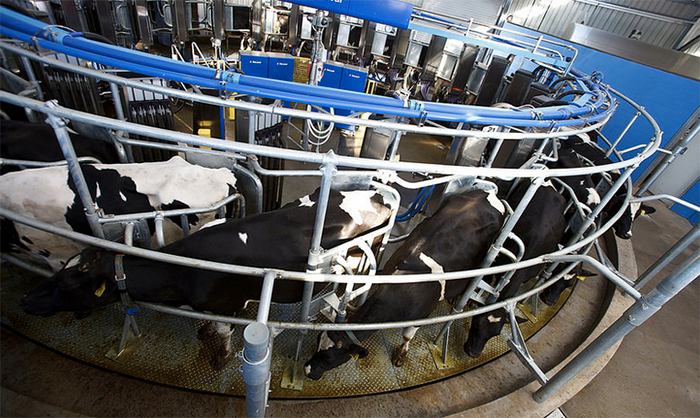
As EU milk quotas come to an end, NFU dairy board chairman Rob Harrison has urged all countries to act responsibly and collectively in order to manage future volatility.
First introduced in 1984 at a time when EU production far outstripped demand, the quota regime was one of the tools introduced for overcoming these structural surpluses.
Milk quotas were introduced in 1984 to address the structural oversupply on the EU market of the late 1970s and early 1980s that had led to the infamous milk lakes and butter mountains.
Mr Harrison says it’s difficult to predict what will happen once quotas are abolished. “Farmers and dairy processors here do have some concerns about how other EU countries will react to the ending of quotas. Some are rapidly increasing their output without an end market for these goods. With milk prices yet to show any strong signs of recovery, this could push farmgate milk prices down further in the EU, and stall any recovery in the dairy markets. It’s vital that expansion in any Member State is planned in accordance with available market opportunities.
“Here in the UK, it’s been low and volatile prices that have affected milk production rather than quotas – in fact the UK has been under quota for the past 15 years. Environmental factors will play a greater role across the EU in the future especially with plans for ammonia and methane reduction targets on the horizon. Weather and animal health issues, specifically bovine TB are also major factors affecting the UK dairy industry.
“We know a number of tough challenges lie ahead especially with prices but the long-term outlook is good, with growing demand and production opportunities. However, the next government and the EU must do more to ensure a sustainable future for the dairy sector and help make tools available for farmers to manage volatility. We also need UK dairy processors to recognise and promote potential markets both at home and abroad and look to develop new products such as sports drinks.
“Through all of this, it’s heartening that the British public is still supporting the British dairy industry and voting for Great British food. I urge them to continue buying British milk, cheese, yoghurt and butter. Look out for the Red Tractor and keep on backing British farming.”
Green South West MEP, Molly Scott Cato has warned that ending the EU’s milk quota system could increase the vulnerability of small scale dairy farmers in the South West.
The EU milk quota system, which has been in place for 30 years, ends today and there will now be no instrument governing production quantities for dairy products in the EU. Molly Scott Cato, who sits on the European Parliament’s Agricultural Committee, said:
"The milk quota achieved its purpose of reducing public spending on indefensible butter mountains and milk lakes, but it could not prevent the massive price fluctuations and ever greater concentration of dairy production that we have seen in recent years. It was time to end the quota but simply discontinuing it will leave smaller dairy farmers vulnerable to crisis situations, like oversupply and price shocks.
Greens point to the fact that the number of dairy farmers in the UK has halved in the last decade, and the National Farmers' Union now predicts that there will be fewer than 5,000 dairy farmers left by 2025.
The European Parliament is currently drafting a report on the consequences of ending the milk quota system.
Dr Scott Cato believes there is now an opportunity for the EU to put in place appropriate measures to benefit small scale dairy farmers:
"Further liberalisation would lead to an industrialisation of the dairy sector, with farms compelled to expand and take on debts to compete or close down. This would undermine attempts to create a more sustainable agricultural model. Instead, smaller farmers should be encouraged to produce quality dairy products in a sustainable manner. Introducing origin labelling rules could promote shorter supply chains, while introducing a compulsory contract system would ensure farmers have greater power in the supply chain."
